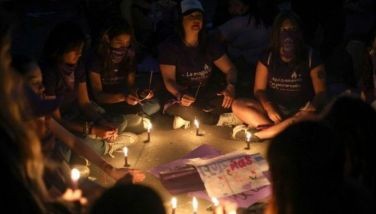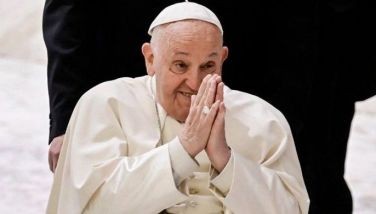Zionism debate at heart of bitter Israeli vote
JERUSALEM — What is Zionism? The ideological question, rooted in the 19th century, has gained surprising urgency in an Israeli election campaign that seems more open than had been expected.
Seeking to take votes from the nationalistic right of Prime Minister Benjamin Netanyahu, the relatively liberal opposition has rebranded itself as the Zionist Union — sparking a debate about a concept that some considered resolved when the Jewish state was declared and widely recognized in 1948.
Since adopting the name in early December, Isaac Herzog's Labor Party — bolstered by a smaller grouping led by former opposition leader Tsipi Livni — has surged in the polls. They are now running neck-and-neck in the polls with Netanyahu's Likud.
The debate over who best reflects the ideals of Zionism — and who can most credibly lay claim to its successes — has lent an oddly philosophical hue to a campaign that had been dominated by more prosaic issues such as budget scandals in the management of the prime minister's residence. Along the way, the stage appears to have been set for a surprisingly climactic vote on March 17.
On the left, politicians speak of true Zionism as requiring the establishment of peace and equality in the land, including by making peace with the Palestinians and giving up land if needed.
Netanyahu has mocked his rivals as "the anti-Zionist Union." Backers of his Likud tend to equate the term with a strong Israel standing up to its enemies, and with the West Bank settler movement specifically. Ideological settlers view themselves as true Zionists, called upon to reclaim the Holy Land in its entirety almost regardless of the consequences.
Danny Danon, a senior Likud parliamentarian, argued that the opposition was weakening Israel with excessive sympathy for the Palestinians, alleging that some on the left have praised refusal to serve in the army or support the Arab view that the founding of the country was a catastrophe.
"Some in that camp are trying to change the nature of Israel and (use) the name Zionist Union to hide some of the comments made by their members," Danon said.
Hilik Bar, secretary-general of the Labor Party, counters that "we who are dealing with the most important things in society, aspire to reach peace and speak to our enemies — this is Zionism."
The modern idea of a return to "Zion" — Jerusalem or the Holy Land — has been around since the 19th century, when European Jews facing anti-Semitism began to contemplate a Jewish nation-state in the land of their biblical forefathers. Austrian journalist Theodor Herzl popularized the notion in an 1896 manifesto, "The Jewish State," and built what would become the international Zionist movement.
That dream culminated with Israeli independence in 1948, when the fledgling country emerged as a refuge for the world's Jews in the aftermath of the Holocaust.
"According to one theoretical concept, since the state of Israel was established, Zionism had achieved its goal and that was it. But that's not the way it was," said Tom Segev, an Israeli historian and author who has written books about early Israel.
Today, he said, "Zionism has become an equivalent to patriotism," he said, criticizing this approach for ignoring the key issue of resolving the conflict with the Palestinians.
The establishment of Israel turned out to be only the beginning. Early Israel was tested by wars and waves of immigration.
In 1967 came a game-changer: in a war that lasted six days Israel captured Arab territories including the West Bank and east Jerusalem — parts of the biblical Land of Israel but also home to hundreds of thousands of Palestinians.
Today the number of Palestinians in the territory is about 2.5 million, and most live in islands of autonomy administered by the Palestinian Authority. But Israel is the ultimate ruler, and the occupation, in the minds of most people, essentially grinds on. Many of Israel's neighbors reject its existence and its final borders are an open question. Gaza, ruled by Hamas militants and blockaded by Israel, has another 2 million Palestinians and is part of the equation.
Many Israelis feel the situation is unsustainable, both because of the hardships it imposes on the Palestinians and the demographic implications, with the population of Israeli Arabs and Palestinians in the territories on track to eventually outnumber Jews.
Therein lies the logic of the Zionist Union moniker: that the occupation, by saddling Israel with millions of Arabs, is endangering its status as a "Jewish state," leading toward a demographic composition that could more aptly be called a "binational state" where Jews no longer outnumber Arabs.
Bar said this would either mean the end of Israel as a Jewish state or result in "a kind of apartheid state" where Arabs will not be allowed to vote. "They (the right) will lead us to a very horrible situation. This is the end of Zionism," Bar said.
But with party support having remained stagnant in the polls since the initial surge, and with three weeks before the election, the definition has been broadened out.
Omer Bar-Lev, a former top military commando, tells voters he "led fighters in the rescue at Entebbe" — Israel's dramatic 1976 rescue of hostages in Uganda. "That is Zionism."
A recent campaign video made no mention of the Palestinian issue. Instead, a slew of politicians equated Zionism with social justice, economic opportunity, better schools and a nod to mandatory military service. Of late, this is the direction the campaign is taking.
A young Labor lawmaker, Stav Shaffir, recently became a viral sensation when she lectured her right-wing opponents on the true meaning of Zionism in a parliamentary speech.
"Real Zionism is solidarity — not only in battle, but also in the day-to-day. Looking after each other," she said. "That's what Zionism is: to take care of the future of Israel's citizens — in the hospitals, in the schools, on the roads, and in social welfare. That's Zionism, and you're destroying it," she said of her colleagues on the right.
Former Education Minister Shai Piron of the centrist Yesh Atid Party bristles at the use of Zionism by left and right alike. "Zionism is far more than what they say. They are using this for political reasons," he said.
"Zionism is our story, the Jewish story," he adds.
Such a view could pose a problem for Herzog. Arab citizens make up about a fifth of the population of 8 million in Israel proper, with the West Bank and Gaza removed from the picture. Their once-divided politicians are running on a joint slate that some polls show as possibly emerging as the third-largest in parliament. Like the Palestinians, many Israeli Arabs equate Zionism with land grabs, discrimination and military occupation.
As much as they detest the Israeli right and want a peace deal, they will struggle to ally with something called the Zionist Union, uncomfortable with an argument for withdrawing from the West Bank that is motivated so clearly by the desire to unload fellow Arabs.
___
Associated Press writer Josef Federman in Jerusalem contributed to this report.
___
Dan Perry has covered the Middle East since the 1990s and leads AP's text coverage in the region. Follow him on Twitter at www.twitter.com/perry_dan
- Latest
- Trending



























